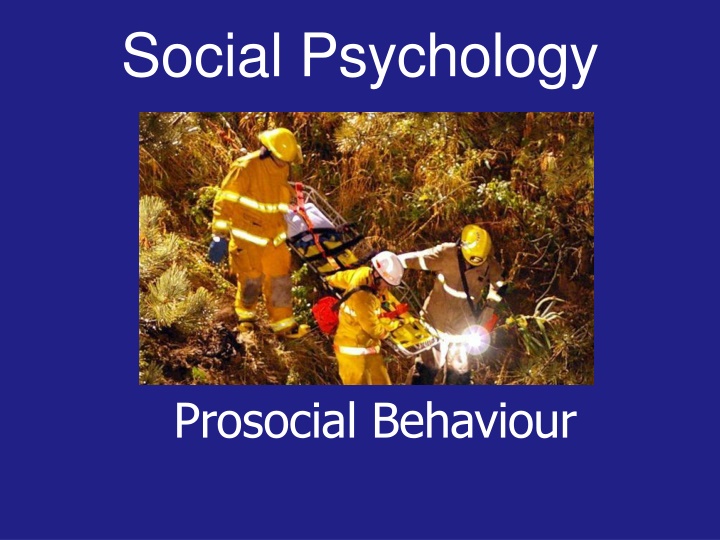
Prosocial Behavior in Social Psychology
Discover the essence of prosocial behavior in social psychology, exploring topics such as altruism, cooperation, forgiveness, obedience, and conformity. Dive into questions about why people help, the balance between selfish and altruistic reasons, and how helping can be nurtured. Explore scenarios influencing decisions to assist strangers and gain insights into genuine altruism. Unveil the profound impact of prosocial acts on individuals and society through examples like barn raising and collaborative knowledge sharing on platforms like Wikipedia.
Uploaded on | 0 Views
Download Presentation

Please find below an Image/Link to download the presentation.
The content on the website is provided AS IS for your information and personal use only. It may not be sold, licensed, or shared on other websites without obtaining consent from the author. If you encounter any issues during the download, it is possible that the publisher has removed the file from their server.
You are allowed to download the files provided on this website for personal or commercial use, subject to the condition that they are used lawfully. All files are the property of their respective owners.
The content on the website is provided AS IS for your information and personal use only. It may not be sold, licensed, or shared on other websites without obtaining consent from the author.
E N D
Presentation Transcript
Social Psychology Prosocial Behaviour
Overview Prosocial behaviour vs. altruism Why do we help? Cooperation Forgiveness Obedience Conformity Who helps whom? When do we help? Bystander help Impact of receiving help Increasing helping
Questions What is prosocial behaviour? Why do people help? Do people mainly help for selfish or altruistic reasons? Thus, are people basically good and helpful, or are they basically selfish? Can we be taught to act in non- natural ways?
Questions Who helps who? Why do humans behave in helpful and cooperative ways - even when it is not in their own self interest to do so? Is there such a thing as genuine altruism? How can we increase helping?
Imagine you encounter a stranger who appears to have collapsed on the street . What factors would influence your decision whether to help this person or not?
What is prosocial behaviour? "voluntary actions that are intended to help or benefit another individual or group of individuals" (Eisenberg & Mussen 1989, p. 3)
What is prosocial behaviour? Doing something good for someone or society. Building relationships Helping society to function. Adding to social capital
What is prosocial behaviour? Includes: Helping others Obeying rules Conforming to socially acceptable behaviour Cooperating with others
What is prosocial behaviour? Example: Barn raising A way of building social capital.
Example: Wikipedia A collaboratively edited encyclopedia. Contributions social & knowledge capital.
What is prosocial behaviour? Example: Philanthropy Largest philanthropic foundation in the world. Aims to spend all of its ~$40 billion in the next 100 years.
Why is prosocial behaviour important? Culture is more than the sum of its parts (but only if people cooperate and follow the rules) Prosocial behaviour builds relationships Antisocial behaviour destroys relationships
What is antisocial behaviour? Doing something bad to someone or society. Damaging relationships Interfering with society s functioning. Reducing social capital
What is antisocial behaviour? Includes: Hurting others Disobeying rules Socially unacceptable behaviour Conflicting with others
Reasons why people engage in prosocial behaviour Self-interest Social status Reciprocity Conformity (e.g., to fairness) Rule of law Evolutionary Altruism Donating blood
What is altruism? Helping behaviours focused only on the well-being of others (and often at personal cost). Prosocial behaviour Altruism (because PS may involve self- interest)
Is altruism possible? If altruistic helpers are only helping to make themselves feel good, aren t they really just being selfish? Does the innate pleasure we get from helping points to the basic goodness of human nature? Is altruism, then, just as natural as selfishness?
Reciprocity Obligation to return in kind what another has done for us Direct reciprocity: Helping someone who may help you later Indirect reciprocity: Help someone; someone else helps you later Willingness to request or accept help is often predicated on ability to return in kind.
Fairness Norms that promote fairness Equity - each person receives benefits in proportion to what he or she did Equality - everyone gets the same amount, regardless of performance People desire a system based on fairness and social exchange Sensitivity about being the target of a threatening upward comparison
Fairness Following fairness norms helps us build and maintain good relationships with others People become depressed and even suicidal when they feel they are taking and not giving People also become distressed when they outperform others Sensitivity of being the target of a threatening upward comparison Those people we outperform might reject us or retaliate
Fairness Underbenefited Getting less than you deserve Overbenefited Getting more than you deserve Fairness requires balancing
Fairness Underbenefitted people become angry & resentful. Overbenefitted people experience guilt (e.g., survivor guilt). We also pay people back after we have harmed them. This sense of fairness, where we worry both about being overbenefitted & underbenefitted, is unique to humans.
Reciprocity Found in all cultures Found in animals People are only willing to request or accept help if they think they can pay it back.
Social norms Reciprocity - we should help those who help us. Social responsibility - help others who are dependent & in need. Social justice - help only when others deserve our assistance. Cultural difference (e.g., Miller et al., 1990)
Rule of law Everyone in the society is subject to the rule of law that governs the society Boosts the quality of life e.g., positive correlation between happiness and rule of law (Veenhoven, 2004)
Learning theory Classical & operant conditioning. Observational learning - modelling behaviour of parents & media. If models are reinforced for helping -> increased helping in observers e.g., Rushton & Teachman (1978)
Tragedy of the commons Depletion of resources owned collectively Each person acts in his or her self-interest, overlooking the fact that overuse of a resource will in the end may destroy it.
Cooperation Prisoner s dilemma: Balance tradeoffs b/w cooperation & competition. Cooperation is fragile and easily destroyed. If either person is not cooperative, then cooperation typically breaks down ( bad is stronger than good )
Hoarding Can be influenced by group and individual differences Decreases when: Identifiable Individuals receive feedback on resource levels Communication & a salient group identity can also decrease hording We re less likely to hoard when we trust others in the group
Obedience Acting in accord with orders from an authority figure Leader
Obedience Some obedience necessary Blind obedience to authority can be destructive (e.g., Nazi Germany) Led to Milgram s classic and controversial work on obedience
Milgram's study of obedience Ps recruited for a study on learning One person is the Teacher, the other is the Learner Rigged so that Mr. Wallace is learner Procedure: Teacher shocks Learner for mistakes Shocks in 15 V increments to 450 (XXX) How far will participant go?
Programmed responses of Mr. Wallace 75 V: moan and grunt 150 V: demand to be released 180 V: cried out that he could no longer stand the pain 330 V: protested that he had a heart condition and insisted that he would not longer take part in the experiment Ominous silence
Programmed responses of the experimenter Please go on. The experiment requires that you continue. It is absolutely essential that you continue. You have no other choice, you must go on.
Milgrams study of obedience Psychiatrists predicted only 1 in 1,000 would deliver most severe shock 65% delivered the most severe shock (to a screaming victim in obedience to an authority figure.)
Milgrams study of obedience Highest rates of obedience Experimenter sat next to the participant Victim was in an other room Lowest rates of obedience Experimenter absent and out of sight Victim was next to the participant
Obedience Can be prosocial, is often highly desirable, and can produce good outcomes Sports teams, corporations, groups, traffic Supports group life and helps cultures to succeed
Obedience Milgram s research represented obedience as a -ve (-ve outcome) Without obedience, society would not function Obedience fosters Social acceptance Group life
Conformity SolomonAsch studies (1955, 1956).
Asch's line study Participate in groups of 7 1 participant all others are confederates Judge which of three lines matches a standard line
Asch's line study Critical trials: all confederates give the wrong answer What does the participant do? Conformity = number of errors that agree with the confederates
Asch's line study 75% conformed at least once (37% of critical trials) Conformity d with group size up to 3 Conformity if responses given privately Conformity much if one confederate disagrees
Conformity Going along with the crowd Normative social influence Conformity to be accepted by the group Informational social influence Conformity based on actions of others as evidence about reality
Conformity May be good or bad People conform more when others are watching them Public conformity Going along with the crowd regardless of what one privately believes Private attitude change Altering one s internal attitude
Conformity Conformity has been given a bad name People will often do foolish, irrational, or bad things in order to conform But conformity is also prosocial People show a strong desire to get along with others
Evolutionary perspectives Innate tendency to help others for evolutionary reasons. e.g., animals exhibit helping behaviour. Kin selection The closer we are genetically the more likely we are to help Life-and-death helping is affected more strongly by genetic relatedness Reciprocal helping - expect to have favour returned





















